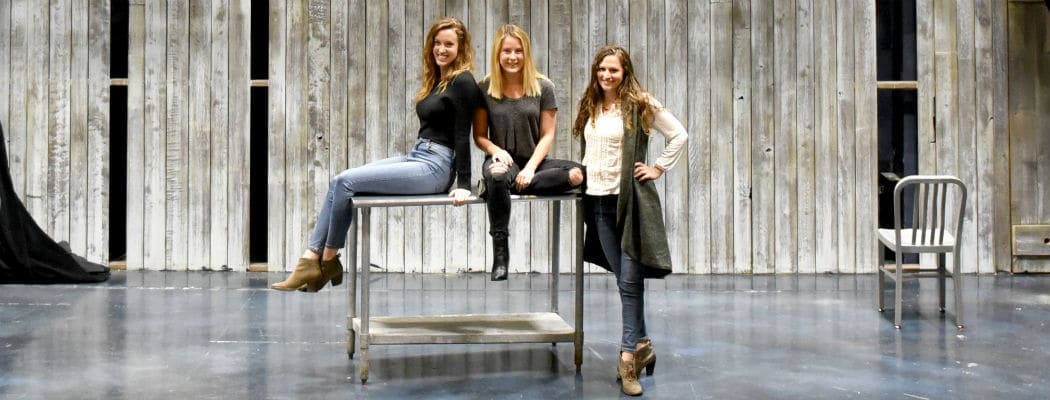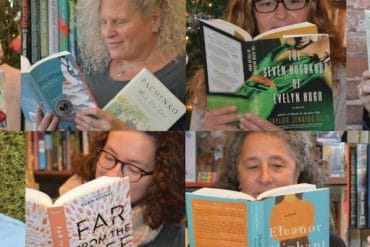Two years ago, Nantucket summer resident Marina Morrissey told us in an interview that she had grand plans to “create infrastructure so that playwrights [could come to Nantucket] in the fall…and enjoy the creative boons of being in such a remote, beautiful, and aesthetically stimulating location.” Well, she made good on that promise.
This fall, she has teamed up with fellow New York-based theater professionals Ashley Teague and Gwen Kingston to bring an original show, FIT, to the White Heron Theatre for three weeks of workshopping and a special two-night only public reading. N Magazine caught back up with Morrissey and her team as they approach their November 3rd and 4th show dates to learn more about FIT and what it is about Nantucket that gets those creative juices flowing.
N MAGAZINE: Marina, tell us about your connection to Nantucket.
MORRISSEY: This place feels like home. My parents are summer residents, and I’ve worked here nearly every summer since I was fourteen. From terrorizing sea creatures at the aquarium as a child, to terrorizing ‘the strip’ as a tween, to terrorizing the Box through college and beyond, so much of my growing up happened here. I was married here two years ago, and my husband and I dream of making the island home for our family one day.
N MAGAZINE: And what about your ties to White Heron Theatre Company?
MORRISSEY: After college, I moved to New York to work as an actor. I had heard about White Heron’s first summer season in the tent, and was eager to meet Artistic Director, Lynne Bolton, and find some way to be involved. I auditioned for her and Executive Director Michael Kopko, and have since spent three summer seasons working there as an actor. It’s completely thrilling to be rehearsing FIT inside their gorgeous new theater. Only four years ago, Michael and I were outside on ladders putting up the tent! White Heron is the island’s only equity theater, and has quickly become an important voice in American theater. I feel really lucky to get to bring vital, transformative plays to the people and place I love most.
N MAGAZINE: What is the story behind the show’s title, FIT?
MORRISSEY, TEAGUE, KINGSTON: A central question of this play is: who is fit to be a mother? Who gets to decide? What kind of criteria are we working with? The idea of “fitness” pervades societal discussions around parenthood, guardianship, and even survival. Charles Darwin coined the phrase “survival of the fittest.” He applied it to the animal kingdom, but over the decades it has seeped into the way we think about human society. Who is fit? How do we fit into the little boxes society draws for us? What happens when we don’t?
N MAGAZINE: How did the initial concept for this show come about?
MORRISSEY: I read a series of books and articles about the 1920s Supreme Court case Buck v. Bell, in which the court voted 8 to 1 that the State could forcibly sterilize women deemed “feeble-minded”. I was deeply struck by the way the issues in that case continue to resonate in American life today. I began to wonder: “who was Carrie Buck?” “How did she (a poor, southern girl) come to be at the center of a major Supreme Court case?” “Was she really ‘feeble-minded’?” It felt like it could be a play. So a little over a year ago, I called two of my favorite collaborators (and grad school friends from Brown), playwright and actor Gwen Kingston, and director Ashley Teague. They quickly got on board!
N MAGAZINE: What was the development process like for FIT?
MORRISSEY, TEAGUE, KINGSTON: We began to take note of how that same eugenics language and thinking was present in our current national dialogue around immigration. The rhetoric that certain groups inherently perform better than others has certainly not gone away. Instead of directly engaging with those discourses, we decided to take another tact. Through research and conversations with various advocacy and outreach organizations, we explored how contemporary America deals with the intellectually disabled. This led us to discovering the characters of Don and June, a Down Syndrome couple who want to have a baby. This storyline, in conversation with the life of Carrie Buck, asks audiences to think about their proximity to the intellectually disabled community and how that community contributes to the diversity of a nation. Who gets to be a parent, who gets to decide, and also – how are we are as a society supporting spaces for inclusion?
N MAGAZINE: What makes Nantucket the ideal place to develop new theater projects?
MORRISSEY: The last time I spoke with N Magazine, I said “I would love to find a way to make this place a gestational development destination for theater – a year-round destination.” FIT’s three week workshop feels like an exciting step in that direction! Our team is based in New York, and the demands of city life are not always conducive to an ideal rehearsal process. You just don’t have the time to try everything you want to try! Space is expensive, people are busy, and it’s hard to find the time and money to really dive into new work the way we’re allowed to at White Heron. Not only do we have the luxury of space and time, but we get to work against the backdrop of fall on Nantucket. It’s peaceful, it’s quiet, and gives us time as artists to be inspired in new ways. We are also grateful to have Nantucket audiences as the first eyes on this show. There are so many creative and independently-minded people here, and we anticipate learning a lot from the talkbacks after our shows in November.
N MAGAZINE: Tell us about the work you’re doing with island kids around FIT.
MORRISSEY, TEAGUE, KINGSTON: A major gift of this process has been working with Tiffany Gallo, Managing Director of the Nantucket Theatre Institute, and the young island theatre artists she’s connected us with. Three days a week, students at NTI join us in rehearsals, apprenticing us in the room and meeting with us after for one-on-one workshops and discussions. Students heard one of our first read-throughs of the play, and will get to see how it evolves over the course of these three weeks. We have been pretty struck by the sophistication of their questions and insights. These kids are really special. We are inspired by NTI’s commitment to enriching young islanders’ arts education through practical experience with professional artists. Our goal is to leave students feeling empowered to use theater as a tool for asking big questions about our world. Making a new play is hard – it requires vulnerability, brave choices, and a willingness to speak up and really believe in what you have it say. We think that process resonates a lot with adolescents.
N MAGAZINE: Can you talk a little about being an all-female creative team?
MORRISSEY, TEAGUE, KINGSTON: Often when we study history, we are looking at male-driven narratives. We believe it’s important for women to know their own histories. With FIT, we’ve made it our mission to exhume these untold female stories, and give voice to a woman whom history has effectively silenced. By imagining into Carrie’s story, we hope to shed new light and raise new questions about how we confront our reproductive potential today. Our system of collaboration is egalitarian; we all share in decision-making and our methodology feels inherently female. This is rarely the case in the entertainment industry. We believe this way of working is vital to a vibrant American Theatre of tomorrow, which demands a diversity of perspectives, experiences and ways of working.
N MAGAZINE: What are your plans with FIT after this Nantucket workshop?
MORRISSEY, TEAGUE, KINGSTON: This workshop will launch FIT into a fully-realized New York City production in 2018. Using feedback from our talkbacks, and discoveries from our process, we hope to emerge with a rock-solid script, and a fuller understanding of how we will stage this show in New York. In New York, the characters of Don and June will be played by actors with Down Syndrome, and we are excited to get to represent that community and their stories onstage.
FIT will be performed at White Heron Theatre Company on Friday, November 3rd and Saturday, November 4th at 6:30 P.M. Friday evening’s performance will be a special community show and talkback with a “pay what you will” pricing structure (audience members can pay anywhere from $5-25 to see the show and join us for a discussion). Tickets for Saturday evening’s show are $25 and include entry to a post-show cocktail party with cast and crew. For tickets and more information, click here.
Save
Save











